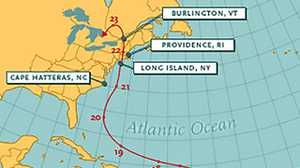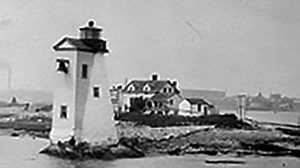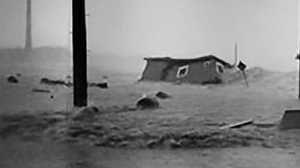Harrison McDonald

Harrison McDonald was traveling by train from Albany, New York, to Boston, Massachusetts. His train, the Wolverine, left Albany at 8 am on September 21, 1938.
Harrison McDonald: We got to Springfield [Massachusetts] and they told us there was a washout and the train had to be rerouted. So we started off for Hartford, creeping very slowly, with the water lapping around the tracks at various points. We made it all right, and started off for New London [Connecticut]. Within about three miles of the town, at 3:15 Wednesday afternoon, the hurricane and flood stopped us.
Harrison McDonald: The engineer, a smart fellow, pulled ahead to a sharp curve in the track and stopped there. He figured the curve of the cars against the wind would help us and I guess it did. I don't think the train could have stayed upright if it was broadside to the wind and in a straight line. A Pullman car weighs sixty-seven tons and as it was, the cars were rocking from one track to another -- not just shivering and shaking, but literally rocking.
He was right to be concerned. A number of trains were literally blown off their tracks. Because train tracks were laid to follow naturally flat paths next to streams, the tracks were especially vulnerable to flood. At least two passengers drowned on trains that were submerged, and miles of track were suspended in air after the earth below them was washed out.
McDonald's train stayed upright through the night.
Harrison McDonald: The next morning, we were taken into New London in buses. The first thing we were given was a card from the National Guardsmen warning us not to drink water or to pour milk without boiling it. The first store I saw was a five and ten cent one. It had been flooded out, but one counter had been set up on the sidewalk and they were selling candles only. We walked down to the business district and found the firemen still pouring water into the smoldering embers.
McDonald watched as the local residents tried to get their bearings.
Harrison McDonald: I was standing at the desk in the Western Union office when a young schoolgirl came in. She was looking for her younger sister, who had not been heard from since school let out the afternoon before. The clerk said they had no report on her. A moment later, a businessman came in. 'Can I get a wire through to New York?'
Harrison McDonald: 'No,' said the clerk.
Harrison McDonald: 'Well, I don't suppose it's essential,' he said. 'I'd just like to let my company in New York know that they haven't got any New London factory any more. It's not a problem of damage, but one of complete abolition.'
Harrison McDonald: They had no electricity, no lights, no heat, no power of any kind. There was also no accurate estimate of the dead and missing.
From New London, McDonald continued on to Boston, arriving by cab in Providence, Rhode Island around 11pm, Thursday, September 22. The floodwater had reached Providence's low-lying downtown at 5pm the day before. The water had submerged cars within half an hour and reached up to second story windows before easing out again. Horrified onlookers watched people drown in the middle of downtown squares.
When the waters receded, desperate citizens looted downtown businesses before the National Guard could take control.
Harrison McDonald: It was one of the weirdest sights I have ever seen. It was like a city in wartime. The entire business district was roped off and patrolled by armed soldiers. Huge antiaircraft lights pierced the night, shooting long slender pencils of bluish light into the darkness....
Harrison McDonald: There were no lights in the city and as you registered in the Hotel Biltmore, there was a sign reminding you to take a candle with you. You had to climb to your room as well, since the elevators were out of order. All the stores were guarded, food was rationed out as you put in your order; martial law existed, of course, and bars were closed.
McDonald finally made it to his destination, Boston, on the 23rd of September.
Harrison McDonald: You don't know how queer it seems to be in a normal city with lights, heat, and telephones running.
Although Boston was not as hard hit as New London and Providence, "normal" was a relative term.







